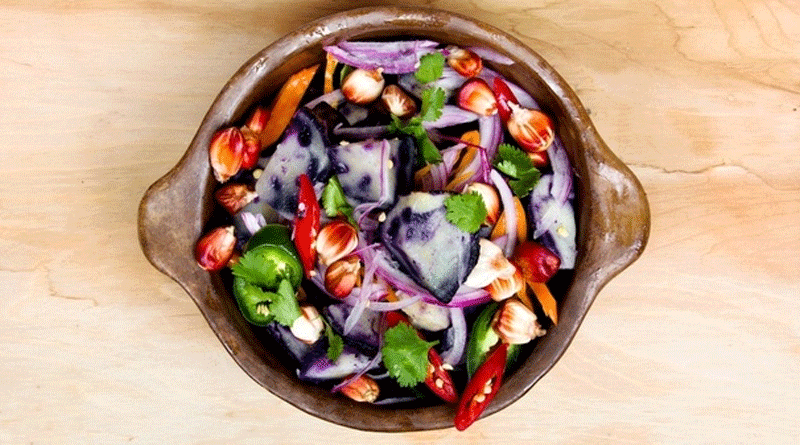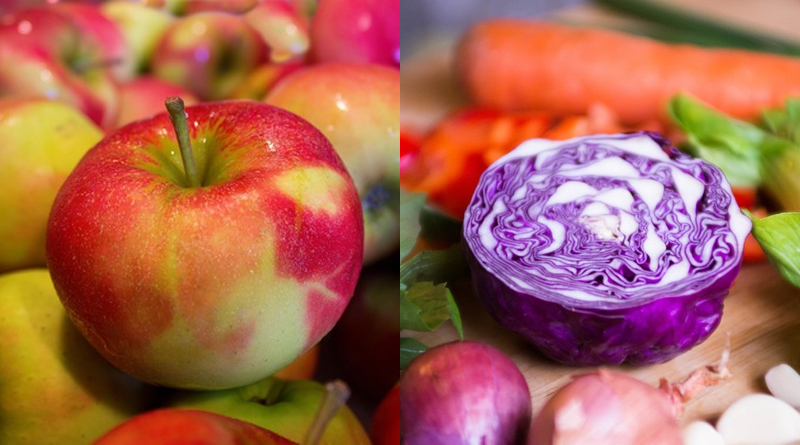FRUIT OR VEG – WHICH IS BEST?
Everyone knows that the basis of a healthy diet is getting that five-a-day (or is it now eight-a-day?) but the big question is this: are some fruits and vegetables born more equal than others? And should we aim for getting more vegetables, rather than fruit – or more fruit rather than vegetables?
Let us set the record straight and arm you with some tips on nifty ways to up your overall fruit and vegetable intake without it ever feeling like a chore.
A recent study by University College London found that the optimum daily intake of fruit and veg is actually closer to ten servings a day, and that the 65,000 participants who regularly ate seven or more portions a day were 42% less likely to die from any cause during the twelve year study.
Fruit or veg – which is best?
Fruits and vegetables are similar beings in that they both offer you relatively cheap and easy access to fibre, antioxidants, and all manner of wholesome nutrients. But the biggest difference between the two, and the reason we would lean towards veg over fruit, is that fruit tends to be higher in sugar. In the above-mentioned UCL study, vegetables were shown to be better at prolonging life over fruit, with each portion of vegetables regularly consumed lowering the chance of death by 16% and fruit by just 4%. Interestingly, the Australian government has rebranded its dietary advice as “two plus five a day,” in response to studies like this, stipulating that two pieces of fruit couples with five portions of vegetables is optimum.
Now we know vegetables should take precedence over fruit, let’s look closely at the foods that make the biggest difference to your health and wellbeing.

Organic every time or just sometimes?
Certain fruit and veg are more likely than others to be riddled with pesticides and other substances that can harm the nervous system and cause fertility problems, immune system suppression and Parkinson’s disease. The following produce should be bought organic wherever possible:
- Peaches
- Apples
- Celery
- Strawberries
- Spinach
- Imported grapes
- Nectarines
- Lettuce
- Cherries
- Sweet bell peppers
- Potatoes
The following foods are lower on the pesticide scale, so are generally safer to buy non-organic:
- Broccoli
- Bananas
- Mango
- Avocado
- Frozen peas
- Pineapple
- Asparagus
- Onions
- Kiwis
- Cabbage

Fruit and veg for weight loss
If you’re looking to drop a few pounds, some fruit and veg will be far more helpful than others, and sugary fruits should be avoided. Starchy and high-GI veg like potatoes, parsnips and corn will impede weight loss while spinach, Swiss chard, mustard greens, watercress, kale and cabbage are all low-calorie foods full of alkalizing goodness. Green juice is a superb way to up your vitamin intake, but bear in mind that five portions of juice does not equal five portions of fruit/veg. A juice can only count as one portion.
So which fruits are high sugar and which are low? Below we’ve compiled a list of most-sugary-to-least-sugary fruits.
Low sugar
Lemons and limes
Rhubarb
Raspberries, blackberries and cranberries
Low-medium sugar
Strawberries and blueberries
Papaya
Grapefruit
Most varieties of melon
Peaches and nectarines
Apples
Guavas
Fresh apricot
Medium-high sugar
Plums
Pineapple
Oranges
Kiwi fruit
Pears
High sugar
Grapes
Figs
Tangerines
Cherries
Bananas
All fried fruit
Pomegranate
Mangoes

What difference does the preparation make?
How you prepare your fruit and veg also has a significant bearing on how much good it’ll do you. Raw food – vegetables in particular – has seen a revolution in recent years and not without good reason, but it’s not always appropriate to serve a meal with raw veg. Contrary to popular belief, if you’re going to cook your vegetables it’s usually healthier to microwave or griddle them. Vegetables will hold onto the highest levels of antioxidants when cooked using one of these means as opposed to boiling or frying.
For example, the biggest antioxidant loss in one study was seen in cauliflower after boiling, peas after boiling, and aubergine after boiling and frying.
Artichokes are superstars at holding onto their inner goodness and preserved high antioxidant levels even with boiling. Carrots, celery and green beans, interestingly, saw higher antioxidant levels with cooking – but not when boiled.
If there’s one rule to take from this, it’s that boiling tends to be the worst thing to do to vegetables if you want to preserve goodness (and let’s face it – taste). Look at griddling, steaming and blanching veg to keep the goodness in, and don’t rule out frying in favour of boiling necessarily – it might be better for you to fry after all.
Try to buy fresh wherever possible, but don’t rule out freezing fruit and veg as a smart way to preserve the life of good food that would otherwise be wasted. Better freezing, defrosting and eating those yummy blueberries than not eating them at all, we reckon. And a vegetable in any form – be it canned, frozen or fresh – is better than none. In fact, freezing may not have the negative impact on nutrients that you might naturally expect: a 2010 study found that frozen clementines retained all of their original Vitamin C content.
In conclusion, increase the ratio of veg to fruit, opt for more low sugar fruits (over the high sugar varieties) and avoid boiling wherever possible.
Ilona Wesle is a nutritionist and co-founder of MyDetoxDiet.co.uk, a leading expert in detoxing, cleansing and alkalising. With a shop and detox centre in Greenwich and a nationwide delivery service offering fresh, vegan, detox diets direct to your door, MyDetoxDiet.co.uk offers everything you need to detox your body and boost your energy. And if you are specifically looking for weight loss – then MyDetoxDiet.co.uk can design a nutrition plan to suit you.


